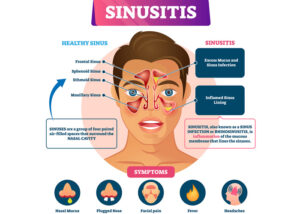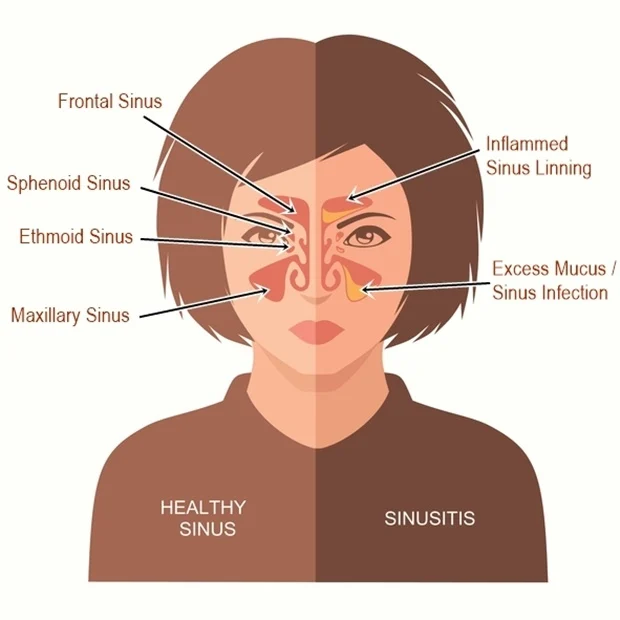Do you often find yourself with blocked ears and a constant ringing sensation? While confusing the symptoms is easy, it’s important to understand the difference between sinusitis and rhinitis. Sinusitis is the inflammation of the sinus cavities, typically caused by a bacterial or viral infection. On the other hand, rhinitis refers to the inflammation of the nasal passages, usually triggered by allergens or irritants.
In sinusitis, the blocked ears are usually accompanied by facial pain, a stuffy or runny nose, and thick nasal discharge. Conversely, rhinitis causes a runny or congested nose, sneezing, and itching of the eyes, nose, or throat.
Understanding the distinction between sinusitis and rhinitis is crucial for effective treatment. Misdiagnosing the condition can result in ineffective medication and prolonged symptoms. By knowing the root cause of your discomfort and seeking appropriate medical advice, you can find relief and regain your quality of life. So, if you’re experiencing blocked ears and ringing, take the time to educate yourself about sinusitis and rhinitis, and consult a healthcare professional for an accurate diagnosis and treatment plan.

Understanding Sinusitis
The inflammation of the sinus cavities and hollow spaces behind the cheeks, forehead, and nasal bones characterizes sinusitis. The primary function of the sinuses is to produce mucus, which helps to moisturize and filter the air we breathe. However, when the sinuses become inflamed, they can become blocked, leading to uncomfortable symptoms.
The causes of sinusitis can vary, but the most common culprits are viral or bacterial infections. Viral infections, such as the common cold or flu, can cause the sinuses to become inflamed. On the other hand, bacterial infections occur when bacteria enter the sinuses and multiply, causing an infection. Other factors contributing to sinusitis include allergies, nasal polyps, a deviated septum, or a weakened immune system.
The symptoms of sinusitis can vary in severity, but they often include facial pain or pressure, a stuffy or runny nose, thick nasal discharge, and a decreased sense of smell. Additionally, blocked ears and a ringing sensation can occur due to the inflammation and mucus build-up in the sinuses. These symptoms can be persistent and impact your daily life, making it crucial to seek proper treatment.
Treatment Options for Sinusitis
When treating sinusitis, the approach depends on the underlying cause and severity of the condition. The main focus of viral sinusitis is managing symptoms and allowing the body to heal naturally. This may involve over-the-counter pain relievers, nasal decongestants, and saline nasal rinses to alleviate congestion and promote drainage.
In cases where bacterial sinusitis is suspected, antibiotics may be prescribed to eliminate the infection. It’s important to complete the full course of antibiotics as your healthcare provider prescribes to ensure the infection is fully eradicated. In some cases, nasal corticosteroids may also be recommended to reduce inflammation and swelling in the sinuses.
For chronic or recurring sinusitis, additional treatment options may be considered. These can include nasal irrigation with a neti pot or saline solution, immunotherapy for allergies, or even surgery to correct structural abnormalities in the nasal passages. Your healthcare provider will work with you to determine the most appropriate treatment plan based on your sinusitis’s severity and underlying cause.
Understanding Rhinitis
Rhinitis is a condition characterized by the inflammation of the nasal passages. It can be allergic or non-allergic. Allergic rhinitis is commonly known as hay fever and is triggered by allergens such as pollen, dust mites, pet dander, or mold. On the other hand, non-allergic rhinitis can be caused by irritants such as strong odors, smoke, changes in weather, or hormonal fluctuations.
The rhinitis symptoms primarily affect the nose but can also extend to the eyes, ears, and throat. Common symptoms include a runny or congested nose, frequent sneezing, itching of the eyes, nose, or throat, and watery eyes. While blocked ears and ringing are less commonly associated with rhinitis, it can occur in some cases due to the impact of nasal inflammation on the Eustachian tubes.

Treatment Options for Rhinitis
The treatment for rhinitis depends on the underlying cause and severity of the symptoms. For allergic rhinitis, avoiding triggers is a crucial step in managing symptoms. This can include minimizing exposure to pollen by staying indoors during peak pollen seasons, using allergen-proof covers for bedding, and keeping indoor spaces clean and free from dust. Over-the-counter antihistamines and nasal corticosteroids can also relieve inflammation by blocking the release of histamines.
Non-allergic rhinitis may require a different approach. Identifying and avoiding irritants is important in managing symptoms. Nasal saline rinses can help to flush out irritants and provide temporary relief. In some cases, prescription nasal sprays or antihistamines may be recommended to alleviate symptoms. If hormonal fluctuations are suspected to cause rhinitis, your healthcare provider may recommend hormone therapy or other medications.
Differences between Sinusitis and Rhinitis
While sinusitis and rhinitis share similar symptoms, such as nasal congestion and runny nose, key differences can help differentiate between the two conditions. Sinusitis is primarily characterized by facial pain or pressure, thick nasal discharge, and a decreased sense of smell. Blocked ears and a ringing sensation can also occur due to the inflammation and mucus build-up in the sinuses.
On the other hand, rhinitis is characterized by a runny or congested nose, frequent sneezing, itching of the eyes, nose, or throat, and watery eyes. While blocked ears and ringing are less commonly associated with rhinitis, it can occur in some cases due to the impact of nasal inflammation on the Eustachian tubes.
Understanding these differences is crucial for accurate diagnosis and appropriate treatment. Suppose you are experiencing symptoms of blocked ears and ringing. In that case, it’s important to consult a healthcare professional who can evaluate your symptoms, perform any necessary tests, and provide a proper diagnosis.
Prevention Tips for Sinusitis and Rhinitis
While it may not always be possible to prevent sinusitis and rhinitis entirely, there are steps you can take to reduce your risk and manage symptoms effectively. Here are some prevention tips:
- Practice good hand hygiene: Regularly washing your hands with soap and water can help prevent the spread of viruses and bacteria that can cause sinusitis.
- Avoid allergens and irritants: If you know you have specific triggers, try to avoid them as much as possible. This can include staying indoors during peak pollen seasons or using air purifiers to reduce exposure to indoor allergens.
- Keep indoor spaces clean: Regularly dusting, vacuuming, and keeping indoor spaces clean can help reduce exposure to dust mites and other allergens that can trigger rhinitis.
- Use proper nasal hygiene: Nasal saline rinses can help flush out irritants and allergens, keeping your nasal passages clean and clear.
- Manage your allergies: If you have allergies, work with your healthcare provider to develop an appropriate management plan. This may include allergy testing, immunotherapy, or prescription medications to alleviate symptoms.
Following these prevention tips and seeking appropriate medical advice when needed can reduce the frequency and severity of sinusitis and rhinitis symptoms, allowing you to regain your quality of life.
Conclusion
Blocked ears and ringing can be distressing symptoms, but understanding the difference between sinusitis and rhinitis is crucial for effective treatment. Sinusitis is inflammation of the sinus cavities, usually caused by a bacterial or viral infection. At the same time, rhinitis refers to the inflammation of the nasal passages, often triggered by allergens or irritants. By knowing the root cause of your discomfort and seeking appropriate medical advice, you can find relief and regain your quality of life. If you’re experiencing blocked ears and ringing, take the time to educate yourself about sinusitis and rhinitis, and consult a healthcare professional for an accurate diagnosis and treatment plan. You can effectively manage your symptoms and improve your overall well-being with the right approach.







